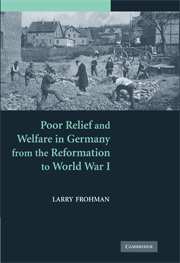Book contents
- Frontmatter
- Contents
- List of Tables and Figure
- Acknowledgments
- Introduction
- 1 Discipline, Community, and the Sixteenth-Century Origins of Modern Poor Relief
- 2 The Rise and Fall of the Workhouse: Poor Relief in the Age of Absolutism
- 3 Pauperism, Moral Reform, and Visions of Civil Society, 1800–1870
- 4 The State, the Market, and the Organization of Poor Relief, 1830–1870
- 5 The Assistantial Double Helix: Poor Relief, Social Insurance, and the Political Economy of Poor Law Reform
- 6 New Voices: Citizenship, Social Reform, and the Origins of Modern Social Work in Imperial Germany
- 7 The Social Perspective on Poverty and the Origins of Modern Social Welfare
- 8 From Fault to Risk: Changing Strategies of Assistance to the Jobless in Imperial Germany
- 9 Youth Welfare and the Political Alchemy of Juvenile Justice
- 10 The Social Evolution of Poor Relief, the Crisis of Voluntarism, and the Limits of Progressive Social Reform
- 11 Family, Welfare, and (Dis)order on the Home Front
- 12 Wartime Youth Welfare and the Progressive Refiguring of the Social Contract
- Conclusion: The End of Poor Relief and the Invention of Welfare
- Sources and Abbreviations
- Index
- References
9 - Youth Welfare and the Political Alchemy of Juvenile Justice
Published online by Cambridge University Press: 17 July 2009
- Frontmatter
- Contents
- List of Tables and Figure
- Acknowledgments
- Introduction
- 1 Discipline, Community, and the Sixteenth-Century Origins of Modern Poor Relief
- 2 The Rise and Fall of the Workhouse: Poor Relief in the Age of Absolutism
- 3 Pauperism, Moral Reform, and Visions of Civil Society, 1800–1870
- 4 The State, the Market, and the Organization of Poor Relief, 1830–1870
- 5 The Assistantial Double Helix: Poor Relief, Social Insurance, and the Political Economy of Poor Law Reform
- 6 New Voices: Citizenship, Social Reform, and the Origins of Modern Social Work in Imperial Germany
- 7 The Social Perspective on Poverty and the Origins of Modern Social Welfare
- 8 From Fault to Risk: Changing Strategies of Assistance to the Jobless in Imperial Germany
- 9 Youth Welfare and the Political Alchemy of Juvenile Justice
- 10 The Social Evolution of Poor Relief, the Crisis of Voluntarism, and the Limits of Progressive Social Reform
- 11 Family, Welfare, and (Dis)order on the Home Front
- 12 Wartime Youth Welfare and the Progressive Refiguring of the Social Contract
- Conclusion: The End of Poor Relief and the Invention of Welfare
- Sources and Abbreviations
- Index
- References
Summary
In imperial and Weimar Germany, youth welfare was the most contentious field of preventive social welfare. Not only were its fortunes most closely identified with those of the larger welfare state idea. It was also in this domain that the socialization of liberal jurisprudence ultimately advanced the furthest, thus revealing most fully the contradictions and ambiguities of social citizenship and the preventive project.
The new youth welfare was based on the recognition that waywardness could be most effectively prevented, and punishment itself perhaps rendered unnecessary, by providing corrective education to children who were neglected and endangered, but who had not yet run afoul of the law. Since the forms of social intervention required to put this preventive project into practice conflicted with traditional liberal principles of family law and social assistance, Progressive reformers were, therefore, forced to rethink the liberal social contract, and in so doing they alternately challenged these liberal principles in the name of the welfare of the community, the family, and the child. The cornerstone of their approach to this problem was the idea of a child's “right to education,” that is, the right to an upbringing that would insure that children developed the physical, intellectual, and moral capacities that they would need in order to fulfill the diverse social obligations that would later be expected of them as adult members of the community.
- Type
- Chapter
- Information
- Publisher: Cambridge University PressPrint publication year: 2008



